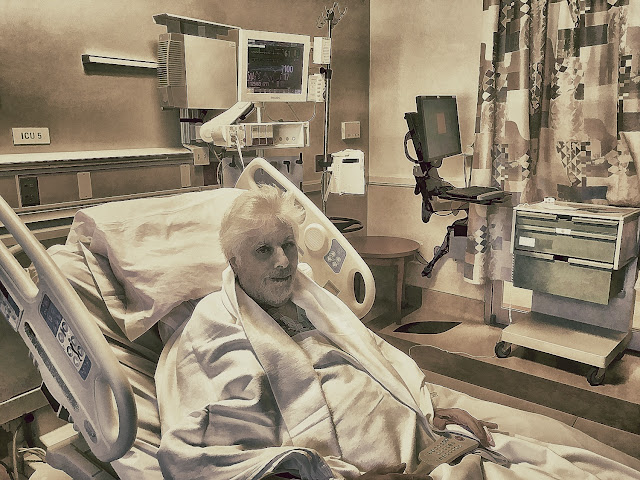This headline isn't an analogy, or some sort of quip. Heart attack isn't a term to be bandied about. The words, "You've had a heart attack" are some of the least welcome you'll ever want to hear.
And I had one, July 2. Out of stupidity? Perhaps. All I know was I confused kundalini symptoms with those of a heart attack? How could this ever come about, you ask? Here's how...
Over the last two years, kundalini has moved massive amounts of energy into and around my left shoulder in an attempt to widen the muscles of that shoulder. I can feel it at work. At the same time, an artery to my heart had evidently started to clog. 'Why' was never fully determined.
That Monday, I awoke, took a shower, started to work but began to feel the type of sensations I'd associated with the kundalini work underway, only this time it was really active, shooting around my arms and shoulders, until finally locking into an area covered by football shoulder pads and it was painful: chest and back, six inches down both arms.
Very painful. And unlike previous what-I'd-call flashes it didn't go away, didn't subside. At first, I tried to ride it out, didn't want to bother my wife if it was eventually going to go away. It still thought it was kundalini.
I jogged and stretched trying to make it go away. But the pressure was to much, like it was being applied from both sides at once — from the inside and from the outside.
The notion this can't be kundalini started to take shape and I woke my wife, who, quite predictably, freaked out, but, like so many heroic women, once she understood, knew exactly what to do.
We piled into the car, and off to the hospital. Only problem...they didn't have a cardiac unit at that hospital, but did in the other hospital, 15 minutes away. So they packed me into an ambulance and away we went.
The drill — switching hospitals — was very efficient. The last thing I remember on the way to the operating room was the doctor telling me, "You've had a heart attack. We're going to place some stents in your arteries to restore blood flow." I had no idea what a stent was.
When I woke up, I felt great. I even got up and walked around the ward with the nurse that afternoon.
So here's the stupid part. When I was able to recall some of the events of the past two years and think things over, I realized that two separate processes had been at work in the same area of my body for the last two years — kundalini and artery blockage. Only I didn't know about the latter because, at first, the sensations I was feeling were consistent with kundalini energy movements I'd become accustomed to for the last 50 years.
The following day the doctor came in with test results, telling me that my heart was in good shape, that I should have a good recovery. I could go back to work the following Monday.
When something like this happens, it's too bad you can't mention kundalini and be understood, that medical science wants no part of the "evolutionary energy."
But Kundalini didn't cause the attack; it's not responsible for the condition of my arteries, or any other organ. That I let my arteries deteriorate is no one's fault but my own. Cholesterol? Perhaps. Genetics? Possibly. The wear and tear on a 80-year-old body? Maybe.
Since the incident, I have investigated the cause and determined that most attacks like mine are due to high cholesterol.
One thing that did register, not that heart attacks are not to be feared, but that there are degrees of intensity. And I'm thankful to have undergone one that, at least for the time being, appears to be less critical. I still have a lot of work to do.
 |
| In the Hospital |
Over the last two years, kundalini has moved massive amounts of energy into and around my left shoulder in an attempt to widen the muscles of that shoulder. I can feel it at work. At the same time, an artery to my heart had evidently started to clog. 'Why' was never fully determined.
That Monday, I awoke, took a shower, started to work but began to feel the type of sensations I'd associated with the kundalini work underway, only this time it was really active, shooting around my arms and shoulders, until finally locking into an area covered by football shoulder pads and it was painful: chest and back, six inches down both arms.
Very painful. And unlike previous what-I'd-call flashes it didn't go away, didn't subside. At first, I tried to ride it out, didn't want to bother my wife if it was eventually going to go away. It still thought it was kundalini.
I jogged and stretched trying to make it go away. But the pressure was to much, like it was being applied from both sides at once — from the inside and from the outside.
The notion this can't be kundalini started to take shape and I woke my wife, who, quite predictably, freaked out, but, like so many heroic women, once she understood, knew exactly what to do.
We piled into the car, and off to the hospital. Only problem...they didn't have a cardiac unit at that hospital, but did in the other hospital, 15 minutes away. So they packed me into an ambulance and away we went.
The drill — switching hospitals — was very efficient. The last thing I remember on the way to the operating room was the doctor telling me, "You've had a heart attack. We're going to place some stents in your arteries to restore blood flow." I had no idea what a stent was.
When I woke up, I felt great. I even got up and walked around the ward with the nurse that afternoon.
So here's the stupid part. When I was able to recall some of the events of the past two years and think things over, I realized that two separate processes had been at work in the same area of my body for the last two years — kundalini and artery blockage. Only I didn't know about the latter because, at first, the sensations I was feeling were consistent with kundalini energy movements I'd become accustomed to for the last 50 years.
The following day the doctor came in with test results, telling me that my heart was in good shape, that I should have a good recovery. I could go back to work the following Monday.
When something like this happens, it's too bad you can't mention kundalini and be understood, that medical science wants no part of the "evolutionary energy."
But Kundalini didn't cause the attack; it's not responsible for the condition of my arteries, or any other organ. That I let my arteries deteriorate is no one's fault but my own. Cholesterol? Perhaps. Genetics? Possibly. The wear and tear on a 80-year-old body? Maybe.
Since the incident, I have investigated the cause and determined that most attacks like mine are due to high cholesterol.
"The average cholesterol for people living in the United States is much higher than 150 mg/dL; it hovers around 200 mg/dL. If your blood test results came back with a total cholesterol of 200 mg/dL, your physician might reassure you that your cholesterol is normal. But in a society where it’s normal to die of heart disease, having a “normal” cholesterol level is probably not a good thing. To become virtually heart-attack proof, you need to get your LDL cholesterol at least under 70 mg/dL."
~ GREGER, MICHAEL - How Not To Die: Discover the foods scientifically proven to prevent and reverse disease. Pan Macmillan. Kindle Edition.By using a combination of diet recommended in the book cited above and periodic blood tests, my LDL cholesterol level tumbled from 164 on 01/04/ 2017 to 46 by 06/26/2019. And by the way, if you think this experience is a rarity, take a look at The Advanced Yoga Practices website.
One thing that did register, not that heart attacks are not to be feared, but that there are degrees of intensity. And I'm thankful to have undergone one that, at least for the time being, appears to be less critical. I still have a lot of work to do.


